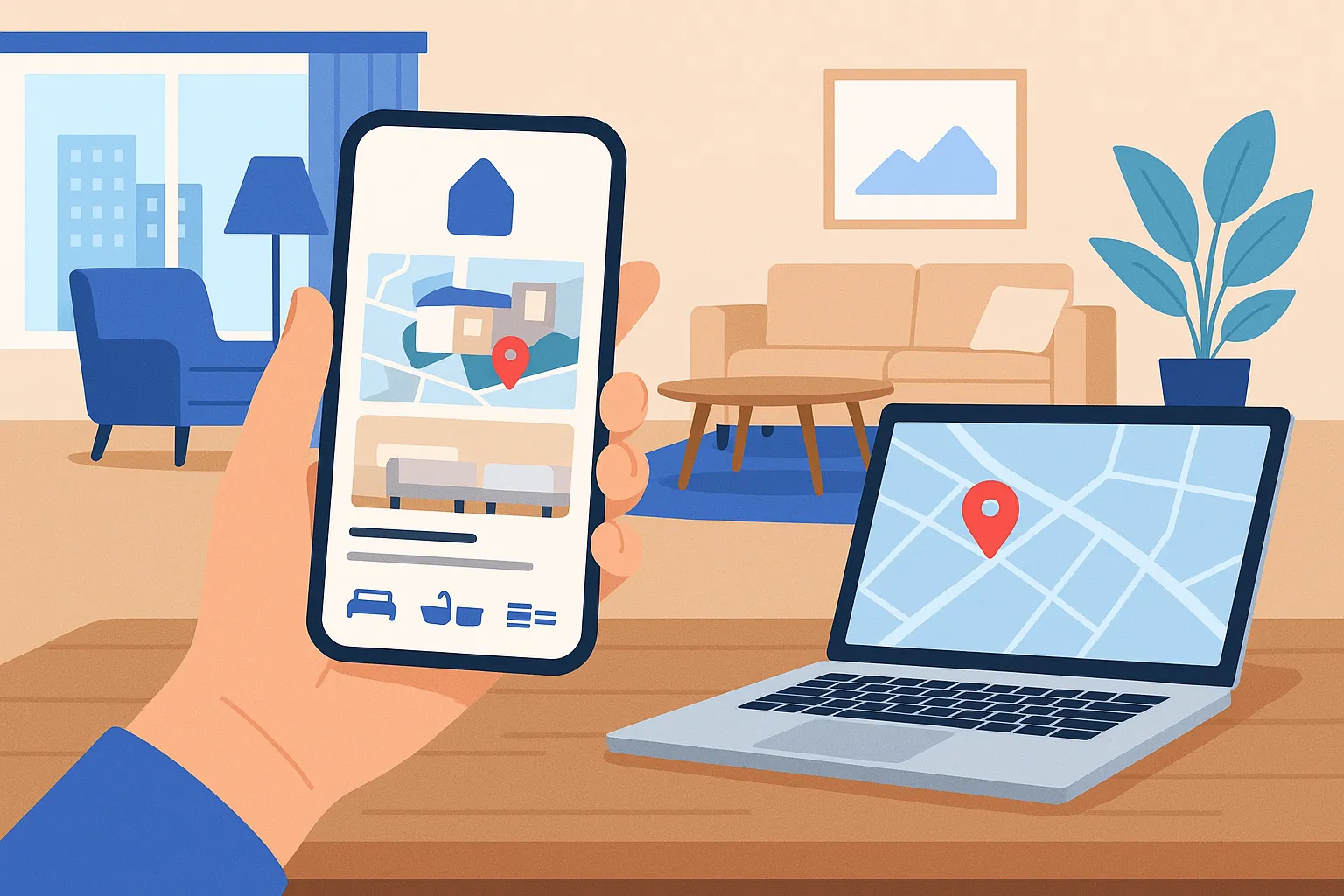Business Model of Blueground has redefined how professionals and digital nomads rent fully furnished apartments for mid- to long-term stays. With a presence in over 30 cities worldwide, the platform combines real estate, technology, and hospitality into one seamless experience.
Its business model is worth studying because it showcases how property management and flexible living can merge into a scalable, tech-enabled operation. Business Model of Blueground has not only disrupted traditional leasing but also created new ways to monetize rentals—making it an inspiring blueprint for startup founders aiming to build their own rental marketplace or property management solution.
What is Blueground & How It Works
Blueground is a technology-powered platform that offers move-in-ready furnished apartments for stays of one month or longer.
Here’s how it operates step by step:
- Problem It Solves:
Renting a high-quality, fully furnished apartment traditionally requires dealing with brokers, long leases, and upfront costs. .Business Model of Blueground eliminates these friction points by offering instant booking, standardized furnishing, and flexible terms. - Who Uses It:
- Digital nomads seeking flexibility without sacrificing comfort.
- Corporate travelers and relocating employees.
- Individuals needing temporary housing during life transitions.
- Digital nomads seeking flexibility without sacrificing comfort.
- How It work Operates:
- Blueground leases properties from landlords on long-term contracts.
- It renovates, furnishes, and decorates the units to brand standards.
- The apartments are listed on the platform with clear pricing and availability.
- Guests book online, often for 30+ days, and can extend stays as needed.
- Blueground leases properties from landlords on long-term contracts.
The platform handles maintenance, customer service, and billing, creating a smooth experience for both property owners and renters.
Read More : What is a Blueground App and How Does It Work?
Ideal Customers for Blueground Rentals
Blueground focuses on a well-defined customer base that values flexibility, comfort, and predictability in mid- to long-term rentals. Here are the main segments:
- Corporate Professionals
Executives and employees relocating for work or on extended business assignments who need hassle-free housing. - Digital Nomads
Freelancers, entrepreneurs, and remote workers traveling between cities and countries who prefer a home-like experience over hotels. - Expats & Relocating Families
Individuals and families moving to a new city who need temporary accommodation while they settle in or search for permanent housing. - Healthcare and Education Workers
Professionals on fixed-term contracts who require fully equipped, short-term residences. - Real Estate Investors & Landlords
While not end-users, property owners are also key stakeholders—leasing their units to Blueground in exchange for predictable long-term income.
By serving these segments, Blueground taps into a massive global demand for ready-made, flexible living arrangements.
Features That Support the Business Model
Blueground’s success relies on a suite of features that streamline operations and drive revenue. Here are the core components:
- Standardized Furnishing & Design
Every apartment is professionally decorated with high-quality furniture, appliances, and decor, creating a consistent brand experience that justifies premium pricing. - Flexible Booking Platform
Guests can browse, book, and extend stays online without paperwork-heavy processes, reducing friction and enabling global scale. - Mobile App for Guests
The app allows tenants to manage their stay, request maintenance, pay bills, and communicate with support—all from one place. - Dynamic Pricing Engine
Blueground uses algorithms to adjust rental prices based on seasonality, demand, and occupancy rates, maximizing revenue per unit. - Property Management Technology
Landlords and internal teams track inventory, maintenance, and performance through proprietary tools that optimize operational efficiency. - Turnkey Utilities & Services
Apartments come fully equipped with WiFi, utilities, and essential services, which are included in the rental price or charged as add-ons.
Read More : Blueground App Features List: What Makes It a Smart Choice for Modern Renters?
Revenue Streams of Blueground
Blueground has developed multiple revenue channels that create steady cash flow and enhance profitability. Here’s a clear breakdown:
| Revenue Stream | How It Works |
| Monthly Rental Income | Guests pay a fixed monthly fee for the apartment, which includes rent, furnishings, and basic utilities. |
| Dynamic Pricing Premiums | Higher rates during peak seasons or high-demand periods drive additional revenue per booking. |
| Service Fees | Charges for cleaning, maintenance requests beyond standard service, and other premium support. |
| Utility & Internet Fees | Utilities and WiFi are bundled into the rent or charged separately, often with a markup. |
| Extension and Renewal Fees | Fees or adjusted rates when guests extend their stay beyond the original agreement. |
| Corporate Contracts | Large-scale agreements with companies providing housing for relocating employees. |
| Furniture & Decor Upselling | Optional paid upgrades or add-ons (e.g., premium bedding, extra appliances). |
Quick Highlights
- Recurring Income
Monthly rent payments are the primary, predictable revenue stream. This steady cash flow helps cover fixed costs and sustain operations. - Ancillary Upsells
Optional services and upgrades, like cleaning or premium furnishings, increase per-customer revenue over time. These extras boost profitability on each booking. - Corporate Accounts
Contracts with enterprises provide bulk bookings and reduce vacancy risks. Long-term corporate relationships also strengthen brand credibility. - Dynamic Adjustments
Smart pricing ensures units are competitively priced while maximizing margins. Rates automatically adapt to seasonality and demand fluctuations.
Read more : Revenue Model of Blueground: How the Furnished Rental App Makes Money
Cost Structure of Operating Blueground
Operating a platform like Blueground requires managing significant expenses to maintain quality and scale efficiently. Here are the main cost categories:
- Property Lease Costs
The biggest expense is leasing apartments from landlords under long-term agreements. Blueground often commits to multi-year contracts to secure favorable rates. - Furnishing & Setup
Initial investment to renovate, furnish, and style each property to brand standards. This includes furniture, decor, appliances, and staging. - Technology Development & Maintenance
Building and maintaining the website, mobile apps, property management tools, and pricing algorithms. - Customer Support & Operations
24/7 guest support, local operations teams handling check-ins, cleaning, and maintenance coordination. - Marketing & Customer Acquisition
Performance marketing campaigns, partnerships with relocation agencies, and brand awareness initiatives to attract both individual and corporate clients. - Utilities & Services
Monthly costs of internet, electricity, water, and other essential services bundled into rent or charged as add-ons. - Property Management & Maintenance
Ongoing expenses to clean, repair, and maintain apartments to ensure high guest satisfaction and brand consistency.
Read more : Blueground App Marketing Strategy: How to Fill Apartments and Win Over Renters
2024–2025 Innovations or Updates
Blueground has continued to evolve its business model to stay ahead in the fast-changing rental landscape. Here are some notable recent developments:
- Flexible Relocation Packages
In 2024, Blueground rolled out customizable relocation packages for corporate clients, including bundled transport, settling-in services, and local orientation sessions. - AI-Powered Pricing & Forecasting
The platform enhanced its dynamic pricing engine with AI models that predict demand trends, optimize occupancy, and adjust rates in real time. - Sustainability Initiatives
New green standards were introduced—energy-efficient appliances, eco-friendly cleaning products, and optional carbon-offset contributions added to monthly bills. - Longer-Term Stays & Memberships
Blueground now promotes 12+ month stays with special pricing tiers and exclusive perks like discounted housekeeping and priority support. - Self-Check-In Technology
To improve guest experience, many properties now offer smart locks and mobile key access, reducing operational costs and simplifying move-ins. - Localized Mobile App Features
City-specific recommendations, concierge services, and local partner discounts have been added to enrich the guest experience.
These innovations not only strengthen the platform’s value proposition but also expand its potential revenue streams and customer loyalty.
Takeaways for Startup Founders
If you’re planning to build a platform similar to Blueground, there are powerful lessons to learn from its business model:
- Control the Supply Chain
By leasing and managing the apartments itself, Blueground ensures consistent quality and brand standards. This creates trust and pricing power. - Invest in Technology Early
A robust platform for booking, dynamic pricing, and property management is critical to scale without operational chaos. - Focus on Flexible Terms
Traditional long-term leases often scare away modern customers. Month-to-month options and simple extensions can be a major competitive advantage. - Maximize Revenue Per Stay
Don’t just rely on rent—upsell services, premium features, and corporate packages to increase lifetime value. - Brand Consistency Wins
Whether it’s design, amenities, or customer support, a standardized experience helps you stand out and earn repeat business.
Read more : Reasons startup choose our blueground clone over custom development
Why Build Your Rental App with Miracuves?
At Miracuves, we specialize in creating ready-made rental platform solutions tailored to your goals. Our expertise in developing property rental clones, booking marketplaces, and end-to-end property management apps means you’ll save time, reduce risk, and launch with confidence.
With Miracuves, you also get continuous support after launch, including feature enhancements, scalability upgrades, and dedicated assistance to keep your platform running smoothly. Whether you’re targeting a single city or aiming for global expansion, we equip you with the tools and guidance to grow faster.
Conclusion:
Blueground has proven that combining technology, property management, and hospitality into a single streamlined experience can create a powerful business model. By offering standardized, flexible living spaces, the company has captured the needs of today’s mobile professionals and enterprises alike.
If you’re inspired to build your own apartment rental platform, you don’t have to start from scratch. With Miracuves, you can launch faster using a proven framework that supports:
- Seamless booking and payments
- Dynamic pricing tools
- Property management automation
- Customizable design and branding
- Scalable infrastructure to grow globally
Ready to build your own Blueground-inspired rental business?
Get in touch with Miracuves today to explore how we can help you bring your vision to life.
FAQs:
1. How does Blueground differ from Airbnb?
While Airbnb focuses mainly on short-term vacation rentals, Blueground specializes in mid- to long-term stays (typically 1–12 months). It leases and manages the apartments directly, ensuring consistent furnishing and services. This model is more predictable for both guests and property owners.
2. What are Blueground’s main revenue sources?
The core revenue comes from monthly rent payments. Additional income streams include dynamic pricing premiums, upsells (like cleaning and utility services), and corporate housing contracts.
3. Is Blueground profitable?
Blueground has raised significant funding and reached profitability in several of its operating markets. The combination of long-term leases and high occupancy helps stabilize cash flow, although profitability varies by city.
4. What technology powers Blueground’s platform?
Blueground uses proprietary software for inventory management, dynamic pricing, booking, and guest services. The mobile app allows guests to handle everything from check-in to support requests.
5. Can a startup replicate this model in a smaller market?
Absolutely. Many successful regional startups have launched by focusing on a single city or niche audience. The keys are controlling the supply, offering standardized experiences, and leveraging technology to streamline operations.
Related Articles :
- Revenue Model of 9flats: How It Monetizes Short-Term Rentals
- Revenue Model of Airbnb: How the World’s Largest Home-Sharing Platform Makes Money
- Most Profitable Furnished Apartment Rentals Apps to Launch in 2025
- Top Airbnb Features Every Vacation Rental App Needs
- Business Model of 9flats | How the Platform Earns Revenue








